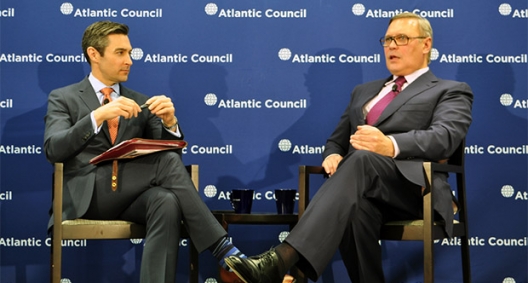
Kasyanov Urges West to Urgently Sanction Hundreds of Russian Legislators, Ministers
The United States and European governments should expand their prohibitions on travel and financial transactions by domestic political allies of Russian President Vladimir Putin, his former prime minister, Mikhail Kasyanov said today. The West should sanction all members of the Russian parliament who voted to support Putin’s annexation of Crimea and to authorize Russian military operations in Ukraine, Kasyanov said in a speech and interview at the Atlantic Council.
As many US legislators and policy specialists argue for broader sanctions to target wide swaths of Russia’s economy, and for military support for Ukraine, Kasyanov urged the West to avoid such steps, and instead attempt a “weakening of cohesion of [Putin’s] ruling group by individual sanctions … against those people who wanted to destroy European security.” A failure to strengthen sanctions could embolden Putin to continue attacks on Ukraine or even neighboring Moldova, he said.
Kasyanov, who served under Putin as prime minister from 2000 to 2004, now co-chairs an opposition group, the Republican Party of Russia-People’s Freedom Party. He spoke to diplomats, policy specialists and journalists in a forum moderated by the Atlantic Council’s executive vice president, Damon Wilson.
In an interview for the Atlantic Council’s website, Kasyanov added that such sanctions should target all legislators who voted to approve a treaty annexing Crimea or to authorize Putin to send Russian forces into Ukraine. They also should hit government ministers and key business allies of Putin still untouched by the US and European strictures, he said. Last month, 598 of Russia’s 605 parliament members approved Crimea’s annexation, according to the state-run news agency, ITAR-TASS. In March, the US government and the European Union each sanctioned about 30 individuals, including Russian officials, for helping to enable Putin’s attacks on Ukraine.
Kasyanov urged the US and European governments to sustain the political and financial support they have offered Ukraine, with a top priority being a “credible, … free and fair election” on May 25 for a new president. Former President Viktor Yanukovych fled Kyiv in February following months of mass street protests against the corruption of his government, and his alignment with Russia rather than the European Union. Kasyanov called for broad financial support to help Ukraine re-schedule payments on its massive debts and “to allow the government [to] stand up, to be strengthened, and to work out this set of [economic] reforms supported by the whole world.” He applauded western help for Ukraine to diversify its energy sources and become less dependent on gas supplies from Russian state-owned corporations dominated by Putin.
Among Kasyanov’s remarks were these:
After Putin’s 2008 attack on Georgia, a weak US and European response emboldened him. After two Russian neighbors, Ukraine and Georgia, sought to take preliminary steps in 2008 to join the NATO alliance, Putin sent Russian troops into Georgia, seizing the regions of South Ossetia and Abkhazia. “A few months after, business turned [out] to be as usual,” in Russia’s relations with the West, Kasyanov said. In subsequent years, US and European companies or governments pursued business deals with Putin’s government, he noted, citing France’s agreement to build at least two high-tech, Mistral-class warships for Russia’s navy. “German companies … pressed their government to continue … getting profitable contracts,” he said. Putin came to feel that “he got a special ticket issued by the West” that left him free to act as he wished in the lands of the former Soviet Union, Kasyanov said.
Putin was surprised by the West’s stronger reaction to his attacks on Ukraine. In recent months, “Mr. Putin and his team, they didn’t expect that the West would react … I would say, with effective measures.”
Sanctions should immediately be applied to more Russian officials and business executives who are giving key support to Putin, to prevent further attacks by his regime. “Effective measures means individual, targeted sanctions,” Kasyanov said. “Me and my party, we are for such sanctions – that’s sanctions not against the people of Russia, that’s sanctions not against the Russian Federation. … That’s sanctions against those people who wanted to destroy European security.”
He added: “In fact, I would say, the sanctions already are bringing appropriate effect.” While changes in Putin’s policies are not yet visible, the individual sanctions have altered “the atmosphere” of decision-making in Putin’s inner circles.
“The West should press now” for “Putin to make a statement” calling on the Russian-backed armed groups who have seized towns and local government buildings in eastern Ukraine “to immediately hand over [their] weapons” in accord with the international agreement reached in Geneva this month. And it should back that demand by expanding immediately – “tomorrow,” Kasyanov said – the list of Russian officials to be subjected to travel and financial sanctions.
A failure to strengthen sanctions and increase pressure on Putin could lead him to attempt “a further intervention, even in Transnistria” – the region of Moldova, adjacent to Ukraine, where Russia for years has backed a secessionist movement. Many analysts have suggested that Putin might try to seize southern Ukraine to connect its Transnistrian client region to a zone of contiguous Russian control extending hundreds of miles westward beyond Russia’s borders.
